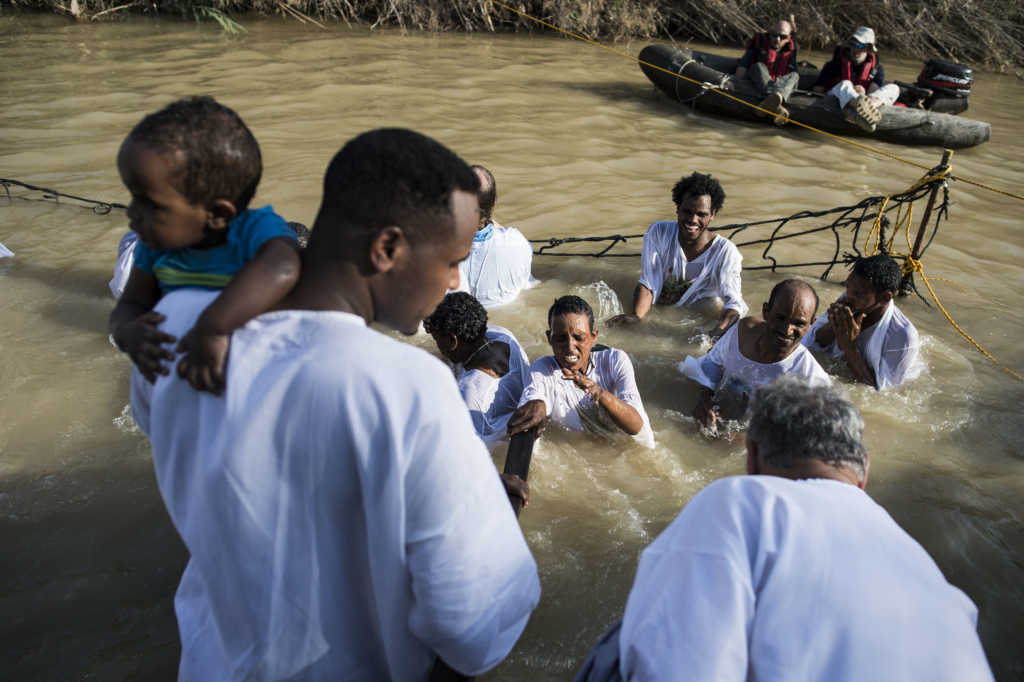An ancient Christian area widely thought to be the site of Jesus’ baptism is to be cleared of some 4,000 landmines by Israeli military forces. Christians believe that Qasr al-Yahud, located about 10 kilometers east of Jericho, is the very spot on the Jordan River where Jesus was baptized.
The Baptism of Jesus is recorded in the gospel of Matthew:
13 Then Jesus came from Galilee to the Jordan to John, to be baptized by him. 14 John would have prevented him, saying, “I need to be baptized by you, and do you come to me?” 15 But Jesus answered him, “Let it be so now, for thus it is fitting for us to fulfill all righteousness.” Then he consented. 16 And when Jesus was baptized, immediately he went up from the water, and behold, the heavens were opened to him,[a] and he saw the Spirit of God descending like a dove and coming to rest on him;17 and behold, a voice from heaven said, “This is my beloved Son,[b] with whom I am well pleased.”
The trouble is, there are an estimated 4,000 landmines in the area where this historic event took place. The surrounding region is home to seven churches, along with chapels and monasteries, each belonging to various different Christian denominations. Qasr al-Yahud had been a popular pilgrimage location until 1968, when Israel blocked access and incorporated it in the closed military zone along the border with Jordan.
Due to its popularity as a tourist location for Christians, in 2011, COGAT — the Coordinator of Government Activities in the Territories — and the National Parks Authority opened a small access road that leads to the baptismal site on the banks of the Jordan River.
Then, in 2016, the UK-based de-mining group HALO Trust, announced that it would begin the painstaking and dangerous process of clearing the landmines around Qasr al-Yahud. However, the actual work has yet to commence. HALO Trust has completed de-mining work in other locations across the West Bank, and has insisted it has been successful in bringing Israeli and Palestinian leaders together.
HALO estimates that some 2,600 anti-tank and 1,200 anti-personnel mines are buried at the 1 square kilometer (0.4 square mile) site, along with treacherous booby traps and improvised explosive devices.
While the exact start date for the work is yet to be known, a Defense Ministry spokeswoman told The Times of Israel it hopes the de-mining will begin in the first quarter of 2018. HALO trust, however, has yet to put forward a solid start date. HALO has raised nearly $1 million toward the de-mining efforts, estimating the full cost of de-mining the area at around $4 million. The Defense Ministry has also contributed funds.
“The chance to clear this very historic place of the mines is going to have not only implications for the area because it will allow people of faith to return and worship in those churches,” said James Cowan, the CEO of HALO Trust, when the effort was first announced in 2016.
“But it will also have wider implications because it means that all three faiths are working together and all seven Christian denominations have been working together. And I think, in an age in which, elsewhere in the world, religious or historical sites are being damaged and pulled down, for humanity to be working together to restore something as huge as this has symbolic implications.”
There are approximately 90 square kilometers (35 square miles) of land with mines in Israel and the West Bank, according to the Wall Street Journal.
Israel is also conscious of the vast number of Christians who visit the country, and understands that interest in the baptism site of Christ is very high. Upwards of 1.5 million Christian tourists came to Israel in 2016, accounting for 53% of all incoming tourists. The average Christian tourist stays almost 10 days in Israel and spends at least $1,500, according to statistics from the Tourism Ministry.
But landmines are not the only hazard to present itself at this important site. The water quality at the baptism site has also raised red flags. Thousands dunk themselves under water every year. According to an Environmental Ministry report from 2014, the fecal coliform count at the Qasr al Yahud site measured in November 2013 was 2,300 per 100 milliliters.



